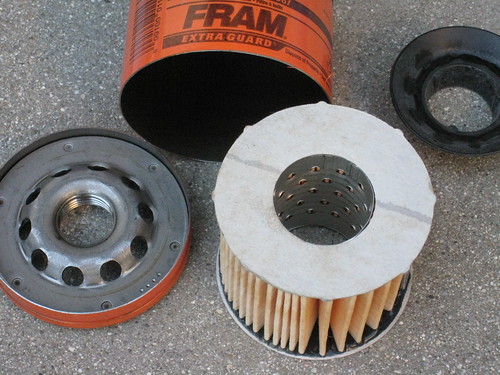
When you buy a new or used vehicle from Keith Pierson Toyota, it will run as smoothly and efficiently as the day it left the factory. But, to keep your car driving like new, it needs to have regular maintenance and servicing. An important element of servicing is having the filters cleaned or replaced.
Dirty and clogged filters can affect your car’s performance, fuel economy, and even the air that you breathe in the cabin. In this article, we’ll take a look at the different types of filters, what they do, and why you need to have them replaced regularly.
Types of Car Filters
Every gasoline- or diesel-powered car has four main filters, or five if it has an automatic transmission. They are the engine oil filter, engine air filter, fuel filter, cabin air filter, and if applicable, a transmission filter. Your car’s filters all have the same basic purpose: to catch impurities and ensure the free flow of fluids and air. This includes capturing dirt and contaminants in the car’s fuel or oil and removing dust and impurities from the air.
Your car needs to breathe as much as you do, and if you don’t have the filters replaced regularly when you drive the Jacksonville roads, they will become more and more clogged until they don’t work properly. Eventually, that will affect the engine’s efficiency and impact the air quality inside your vehicle. Your car will run better and use less fuel if your filters are changed regularly.
Oil Filter
Your car’s engine operates at very high temperatures as the various parts move together to make the vehicle run. Engine oil is essential to lubricate all the moving components to reduce friction and absorb heat from the engine. This ensures the car runs at its best and most efficient, and reduces wear to prolong the life of your engine.
As the oil circulates, it can pick up contaminants, such as dirt, metallic particles, and oxidized oil. The oil filter catches these impurities and cleans the oil, so it can continue to circulate efficiently. The filter has sufficient capacity to hold all the impurities while remaining completely functional until the car is due for an oil change.
If you wait too long to change your oil filter, it will eventually allow contaminants to pass through. That can result in poor performance, the premature wear of engine components, or even engine failure, meaning an expensive repair. Signs your filter is overdue for replacement include a sputtering or jerky engine, metallic engine noises, and a drop in oil pressure.
You should change your car’s oil filter (along with the oil) every 3,000 to 7,000 miles, depending on your driving habits and your vehicle’s age. The climate in Jacksonville, Florida, can be quite harsh on your engine, so more frequent changes would be preferable.
Fuel Filter
Fuel is clean when it leaves the refinery, but by the time it has passed through delivery trucks and gas station tanks, it can become contaminated before it even gets to your vehicle. Your car’s engine depends on the clean delivery of fuel via the fuel pump and injectors to run well.
The fuel filter is a small cartridge that fits inside the fuel line and is designed to catch any impurities before it passes through to the injectors. It helps protect the fuel injectors and maintain the performance and life span of your engine.
When the fuel filter becomes obstructed, the flow of fuel is reduced and the pump has to work much harder to draw fuel. You might have trouble starting up your car, notice poor acceleration, or experience misfiring and stalling. The abrasive nature of contaminants in the fuel can cause excessive wear, damage delicate parts, and cause the failure of the fuel pump and injectors.
It’s generally recommended to replace the fuel filter after 30,000 miles or two years. Check your car’s manual or visit our service department at Keith Pierson Toyota for advice.
Engine Air Filter
For an internal combustion engine to work, it needs a combination of fuel, oxygen, and sparks. The air flowing into the engine needs to be clean for the combustion process to work effectively and to give you efficient power delivery. Air comes into the air intake from the front of the car as you drive.
The air filter is situated just behind the intake under the hood and is designed to keep out road grime, dust, sand, bugs, water, and anything else that comes in through the grille from the Jacksonville highways. A clogged air filter can lead to an incomplete combustion process, causing your engine to sputter, blow out black smoke, and use more fuel. This filter is one of the easiest components to remove to clean or replace.
Transmission Filter
If your car has an automatic transmission, it will also have a transmission filter located just above the transmission fluid pan. The transmission filter prevents dirt, debris, and metal particles from getting into the transmission gears. Changing the transmission filter is a job for one of the expert technicians in our Keith Pierson Toyota service center. Signs that the filter needs to be replaced could be clunky gear changes, strange noises when shifting gear, or a burning smell from the transmission.
Cabin Air Filter
The cabin air filter is part of your car’s heating and ventilation system and prevents air pollutants such as dust and pollen from entering the cabin. If your vehicle has a carbon-activated cabin filter, it will also help keep out exhaust fumes and other odors. The cabin filter helps you breathe cleaner air and extends the life of your car’s HVAC system.
When you bring your car for a service at Keith Pierson Toyota, our technicians will check and replace the filters according to the manufacturer’s recommended schedule. Contact us today to schedule a service or to ask our advice if you have any concerns about your car’s filters.






